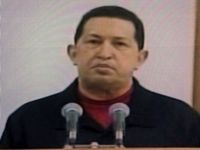Venezuela: Lessons in Socialism and Participatory Democracy
By Olivia Kroth

Sources: Blog Hugo Chavez, Correo del Orinoco, Venezuelanalysis
At the beginning of this year, President Hugo Chavez highlighted the government's achievements and gave an outlook on the coming decade. With the Chavez administration, Venezuela has made a great leap forward in many areas.
The United Nations (UN) and the Economic Commission for Latin America and the Caribbean (CEPAL) confirmed that the country is the least unequal in Latin America.
Poverty has been reduced by 26.8 points, extreme poverty by 19.7 points in the past 12 years.
University enrollment in Venezuela is the highest on the continent, second only after Communist Cuba, and the fifth highest worldwide.
Venezuela's GDP has increased from US$91 million in 1998 to US$328 billion in 2011.
Venezuela's debt in 2011 was 23.6% of its GDP. This means a reduction of 43.2% since 1989.
The Venezuelan people are thankful to the Comandante for improving their lives. Hugo Chavez's approval rating in December 2011 was 57%, according to a poll by GISXXI.
In his annual report he furthermore pointed out the areas where improvement is needed, reducing the crime rate and augmenting the employment rate.
A new Security Mission will tackle the problem of crime from a comprehensive point of view, analyzing the social elements and taking a humanistic approach.
Vice-President Elias Jaua commented, "The cultural element is the key. We have to keep deepening the promotion of values for life and peace, as opposed to a culture of violence. The role of the media is fundamental."
Venezuela has made great progress in implementing participatory democracy. The country has become the vanguard of "21st Century Socialism," which is based on equality, fraternity, liberty, justice and solidarity.
Its Bolivarian form in Venezuela includes the transformation of the economic model by increasing cooperativism and collective property created from the popular bases with the participation of the communities.
In his weekly TV show "Hello President" (Alo Presidente) Hugo Chavez discusses government projects with the Venezuelan people directly, listening to their complaints and taking advice.
In the latest mission, the "Great Knowledge and Work Mission" (Gran Mision Saber y Trabajo), started at the beginning of 2012, more socialist values will be put into practice.
"We want to unleash popular creativity from below, participation and protagonism from the grassroots bases," Chavez said. "It is a constant battle against capitalism. We are not going to carry out the Great Knowledge and Work Mission in order to strengthen capitalist ideas. We must always ask ourselves, where is the socialism in this project?"
The "Great Knowledge and Work Mission" aims at reducing poverty by offering vocational training and jobs. It is part of the government's efforts to reduce the unemployment rate to 3% by 2018, according to Commerce Minister Edmee Betancourt.
The mission will create over 2.8 million new jobs between 2012 and 2018. It is being implemented in four steps: establishment of the legal framework, registration, job training and development of the productive model.
Venezuelans registering in this mission can find training and work in the following areas: agriculture, education, forestry, gasification, housing, medicine, petrol industry, public works, transport.
Half a million new jobs are to be created in the vast oil fields of the Faja del Orinoco, where crude oil is exploited on a grand scale with the help of Chinese and Russian companies.
Chavez announced that houses, hospitals, schools and sports facilities for the families working in the petrol industry will be built in the Faja del Orinoco. These new cities will be developed catering to the needs of the people, ensuring their overall education, health and well-being.
Since the beginning of the registration phase on January 14, over 100.000 people have signed up for the "Great Knowledge and Work Mission" in Caracas, the state of Miranda and the state of Vargas.
In February, the mobile registration points, which are set up in public plazas, will move west, to the Andean region, then south and east.
In March, the training stage of the mission is due to begin at 140 sites of the National Institute of Training and Socialist Education (INCES) across the country.
President Hugo Chavez's vision for the future of Venezuela is that of "a new fatherland, a happy fatherland." La patria nueva, la patria feliz.
Prepared for publication by:
Lisa Karpova
Pravda.Ru
Subscribe to Pravda.Ru Telegram channel, Facebook, RSS!


